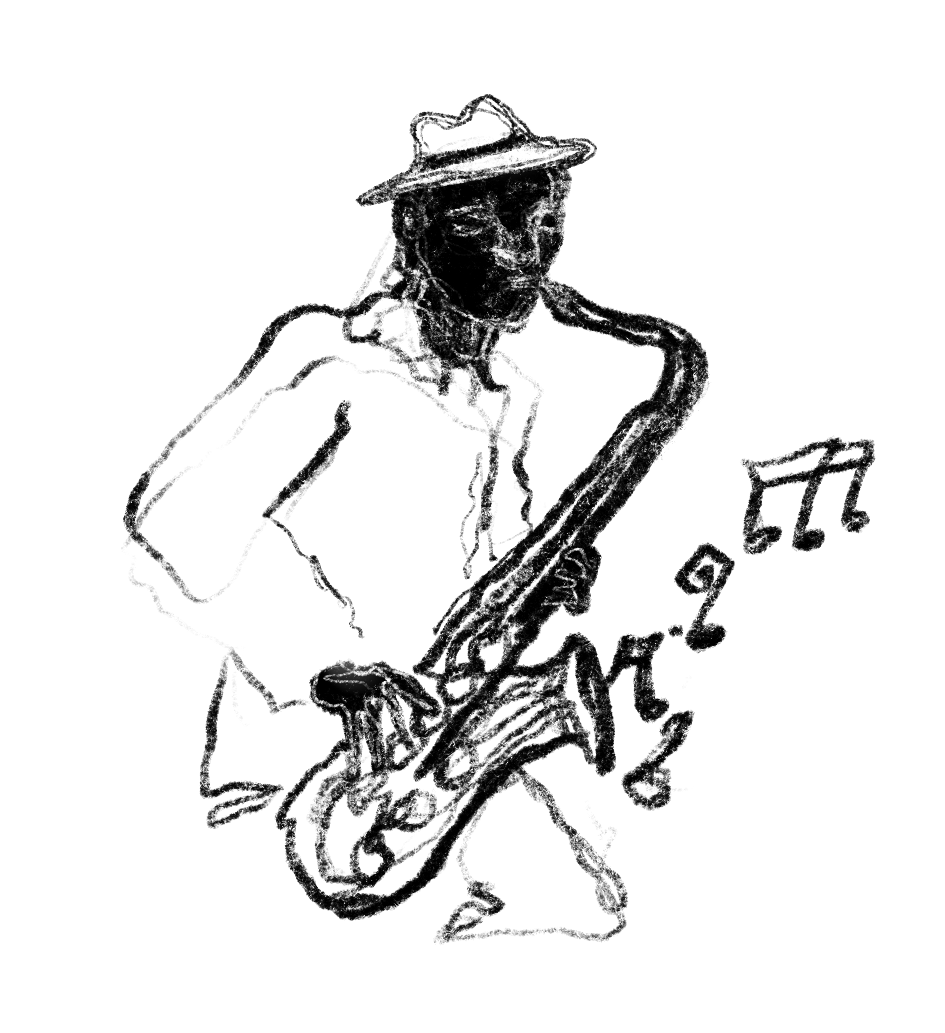“Beyond Category”: McMullen’s History of Jazz course explores music and deepens understanding
September 22, 2023
Editor’s Note 10/20/23 at 5:13 p.m.: This article has been edited to correct a misconstruction of a quote. An earlier version incorrectly paraphrased that Professor McMullen believed jazz in Oakland to be more ‘authentic.’ The article now reflects an accurate characterization of McMullen’s experience with jazz in Oakland jam sessions.
 Amira Oguntoyinbo
Amira OguntoyinboLast Thursday night, Portland’s State Theatre came alive—velvety bass slipped through the cracks of the drums as an enthusiastic crowd danced, bathed in a violet light. In name, this was Digable Planets’ 30th Anniversary Tour, celebrating the Brooklyn hip-hop trio’s release of their debut album, “Reachin’ (A New Refutation of Time and Space)” in 1993. Among the rhythms of the music and under State Theatre’s gilded arches, students from Associate Professor of Music Tracy McMullen’s popular History of Jazz class found a new classroom among the crowd.
While Digable Planets isn’t the biggest name in hip-hop, the group has been on the music scene for decades. The trio—known individually as Butterfly, Doodle and Ladybug Mecca—is accompanied by saxophone, drums and bass. “Reachin” defied the industry standard for hip-hop at the time, commonly known as “gangsta rap.”
McMullen explained that when “Reachin” was released, the genre glorified its artists’ tough image, and that gangsta rap’s marketed success put pressure on creators to conform in order to profit.
The field trip aimed to expose students to what they were learning about inside the classroom. In History of Jazz, McMullen aims to challenge the notion that music is isolated from history, politics and activism. She views the Digable Planets’ work as part of a larger trend.
“Artists have been re-articulating music history through their work, as opposed to the narrators of Black music, who have often been white men,” McMullen said. “I’m trying to convey the power of expressive culture, that through music, real values—important values—can be conveyed.”
In the 11 years that McMullen has taught at Bowdoin, History of Jazz has never had an empty seat. McMullen said that she uses both traditional and unconventional means to teach, a process informed by her work as a musician.
“I’m trying to do these different things because I lose my own energy if [students] are losing energy,” McMullen said. “It’s very much like the call and response of a musician.”
Her pedagogy is inspired by her experiences learning and playing in a series of diverse environments. While attending the historically segregated University of North Texas, McMullen said she learned how removed jazz education had become from its roots, having become an exclusionary field dominated by white men.
In contrast, McMullen said her time at jam sessions in Oakland, Calif. provided a different vision for what jazz could be—founded on an African-American mentorship model.
Gavin Kursman ’24, a double major in Economics and Government and Legal Studies, said that he took History of Jazz because music was outside his comfort zone. He noted that the class is comprised of students from a variety of academic backgrounds, broadening the perspectives explored in the classroom.
“I think that with the liberal arts, one of the greatest benefits is being able to have interdisciplinary classrooms,” Kursman said. “Not just the subject matter going across disciplines, but the different students and the perspectives that they bring in.”
Kursman added that McMullen’s inclusive approach to music is reflected in the breadth of the course.
McMullen emphasized that pushing boundaries is a hallmark of jazz, and music as a whole.
“One of the most famous jazz musicians in jazz history is Duke Ellington, and his phrase he was constantly repeating all the time was ‘beyond category,’” McMullen said. “I feel like that’s exactly what Digable Planets is doing.”
Comments
Before submitting a comment, please review our comment policy. Some key points from the policy:
- No hate speech, profanity, disrespectful or threatening comments.
- No personal attacks on reporters.
- Comments must be under 200 words.
- You are strongly encouraged to use a real name or identifier ("Class of '92").
- Any comments made with an email address that does not belong to you will get removed.

Nice article, but one clarification: I did not say jazz in Oakland was more authentic–as can be noted by the absence of quotes! I recall describing the jam session as within an African American pedagogical tradition. We spend a lot of time in class unpacking ideas about “authenticity,” race, and gender, all of which are quite problematic. So just to note that I did not say anything about a “more authentic vision.” My students are going to be confused! Thanks again for the feature.